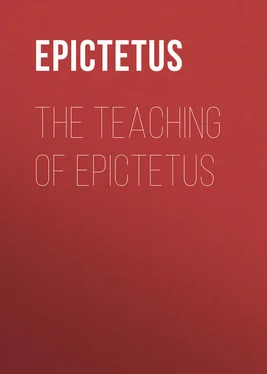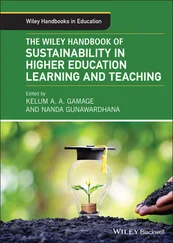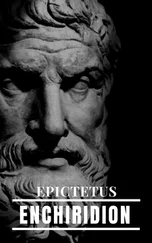Epictetus - The Teaching of Epictetus
Здесь есть возможность читать онлайн «Epictetus - The Teaching of Epictetus» — ознакомительный отрывок электронной книги совершенно бесплатно, а после прочтения отрывка купить полную версию. В некоторых случаях можно слушать аудио, скачать через торрент в формате fb2 и присутствует краткое содержание. Жанр: Философия, foreign_antique, foreign_prose, на английском языке. Описание произведения, (предисловие) а так же отзывы посетителей доступны на портале библиотеки ЛибКат.
- Название:The Teaching of Epictetus
- Автор:
- Жанр:
- Год:неизвестен
- ISBN:нет данных
- Рейтинг книги:5 / 5. Голосов: 1
-
Избранное:Добавить в избранное
- Отзывы:
-
Ваша оценка:
- 100
- 1
- 2
- 3
- 4
- 5
The Teaching of Epictetus: краткое содержание, описание и аннотация
Предлагаем к чтению аннотацию, описание, краткое содержание или предисловие (зависит от того, что написал сам автор книги «The Teaching of Epictetus»). Если вы не нашли необходимую информацию о книге — напишите в комментариях, мы постараемся отыскать её.
The Teaching of Epictetus — читать онлайн ознакомительный отрывок
Ниже представлен текст книги, разбитый по страницам. Система сохранения места последней прочитанной страницы, позволяет с удобством читать онлайн бесплатно книгу «The Teaching of Epictetus», без необходимости каждый раз заново искать на чём Вы остановились. Поставьте закладку, и сможете в любой момент перейти на страницу, на которой закончили чтение.
Интервал:
Закладка:
NOTE: The references in the text refer throughout to the Notes at the end of the volume; each chapter having, where notes are necessary, its own chapter of Notes.
BOOK I
CHAPTER I
the beginning of philosophy
1. Wouldst thou be good, then first believe that thou art evil.
2. The beginning of philosophy, at least with those who lay hold of it as they ought and enter by the door, 9 9 “Enter by the door” ( cf. S. John, x. 1). The parallelisms in thought and expression between Epictetus and the New Testament have often been noticed, and the reader will discover many others, to which I have not thought it necessary to draw attention.
is the consciousness of their own feebleness and incapacity in respect of necessary things.
3. For we come into the world having by nature no idea of a right-angled triangle, or a quarter-tone, or a semi-tone, but by a certain tradition of art we learn each of these things. And thus those who know them not, do not suppose that they know them. But good and evil, and nobleness and baseness, and the seemly and the unseemly, and happiness and misfortune, and what is our concern and what is not, and what ought to be done and what not – who hath come into the world without an implanted notion of these things? Thus we all use these terms, and endeavor to fit our natural conceptions to every several thing. He did well, rightly, not rightly, he failed, he succeeded, he is unrighteous, he is righteous – which of us spareth to use terms like these? Which of us will defer the use of them till he hath learned them, even as ignorant men do not use terms of geometry or music? But this is the reason of it: we come into the world already, as it were, taught by Nature some things in this kind, and setting out from these things we have added thereto our own conceit. 10 10 “Conceit:” οἴησις, Einbildung .
For how , saith one, do I not know what is noble and what is base ? Have I not the notion of it? Truly. And do I not apply it to things severally? You do apply it. Do I not, then, apply it rightly? But here lies the whole question, and here conceit entereth in. For setting out from things confessed by all, they go on by a false application to that which is disputed. For if, in addition to those things, they had gained also this power of application, what would then hinder them to be perfect? But now since you think that you apply rightly the natural conceptions to things severally, tell me, whence have you this assurance?
– “Because it seems so to me.”
But to another it seems otherwise – and he, too, doth he think his application right or not?
– “He doth think it.”
Can ye, then, both be rightly applying the conceptions in matters wherein your opinions contradict each other?
– “We cannot.”
Have you, then, aught better to show for your application, or aught above this, that it seemeth so to you? But what else doth a madman do than those things that to him seem right? And doth this rule suffice for him?
– “It doth not suffice.”
Come, then, to that which is above seeming. What is this?
4. Behold, the beginning of philosophy is the observation of how men contradict each other, and the search whence cometh this contradiction, and the censure and mistrust of bare opinion. And it is an inquiry into that which seems, whether it rightly seems; and the discovery of a certain rule, even as we have found a balance for weights, and a plumb line for straight and crooked. This is the beginning of philosophy. Are all things right to all to whom they seem so? But how can contradictory things be right?
– “Nay, then, not all things, but those that seem to us right.”
And why to you more than the Syrians, or to the Egyptians? Why more than to me or to any other man? Not at all more. Seeming, then, doth not for every man answer to Being; for neither in weights or measures doth the bare appearance content us, but for each case we have discovered some rule. And here, then, is there no rule above seeming? And how could it be that there were no evidence or discovery of things the most necessary for men? There is, then, a rule. And wherefore do we not seek it, and find it, and, having found it, henceforth use it without transgression, and not so much as stretch forth a finger without it? For this it is, I think, that when it is discovered cureth of their madness those that mismeasure all things by seeming alone; so that henceforth, setting out from things known and investigated, we may use an organized body of natural conceptions in all our several dealings.
5. What is the subject about which we are inquiring? Pleasure? Submit it to the rule, cast it into the scales. Now the Good must be a thing of such sort that we ought to trust in it? Truly. And we ought to have faith in it? We ought. And ought we to trust in anything which is unstable? Nay. And hath pleasure any stability? It hath not. Take it, then, and fling it out of the scales, and set it far away from the place of the Good. But if you are dim of sight, and one balance doth not suffice, then take another. Is it right to be elated in what is good? Yea. And is it right to be elated then in the presence of a pleasure? See to it that thou say not it is right; or I shall not hold thee worthy even of the balance. 11 11 “To be elated:” ἐπαίρεσθαι. One might translate, “to be puffed up,” except that that expression is only used in a bad sense, and one may be “elated” in anything that is truly of the nature of the good. The Stoics distinguished between χαρά, joy, and ἡδονή, pleasure; not rejecting or despising the former.
Thus are things judged and weighed, when the rules are held in readiness. And the aim of philosophy is this, to examine and establish the rules. And to use them when they are known is the task of a wise and good man.
CHAPTER II
on the natural conceptions
1. The natural conceptions are common to all men, and one cannot contradict another. For which of us but affirms that the Good is profitable, and that we should choose it, and in all circumstances follow and pursue it? Which of us but affirms that uprightness is honorable and becoming? Where, then, doth the contradiction arise? Concerning the application of the natural conceptions to things severally. When one saith, He did well, he is a worthy man , and another, Nay, but he did foolishly , then there is a contradiction among men, one with another. And there is the same contradiction among the Jews and the Syrians and the Egyptians and the Romans; not whether that which is righteous should be preferred to all things and in all cases pursued, but whether this be righteous or unrighteous, to eat the flesh of swine. And ye can discover the same contradiction in the matter of Achilles and Agamemnon. For call them before us: What sayest thou, Agamemnon, Should not that which is right and fair come to pass?
– “That should it.”
And what sayest thou, Achilles, Doth it not please thee that what is fair and right should be done?
– “Of all things this doth most please me.”
Then make application of your natural conceptions. Whence arose this dispute? The one saith: I am not bound to deliver up Chryseis to her father. And the other saith: Thou art bound. Assuredly one of them must ill apply the conception of duty. And again the one saith: Therefore if I should deliver up Chryseis, it is meet that I take his prize from one of you. And the other: Wouldst thou, then, take from me my beloved? He saith: Yea, even thine. And shall I alone, and I alone, have nothing ? And thus ariseth the contradiction.
Читать дальшеИнтервал:
Закладка:
Похожие книги на «The Teaching of Epictetus»
Представляем Вашему вниманию похожие книги на «The Teaching of Epictetus» списком для выбора. Мы отобрали схожую по названию и смыслу литературу в надежде предоставить читателям больше вариантов отыскать новые, интересные, ещё непрочитанные произведения.
Обсуждение, отзывы о книге «The Teaching of Epictetus» и просто собственные мнения читателей. Оставьте ваши комментарии, напишите, что Вы думаете о произведении, его смысле или главных героях. Укажите что конкретно понравилось, а что нет, и почему Вы так считаете.












